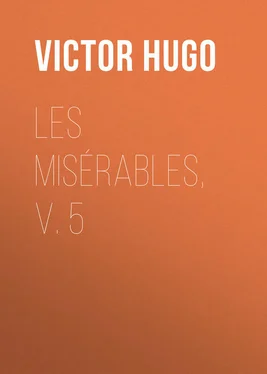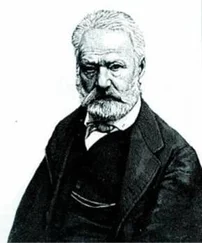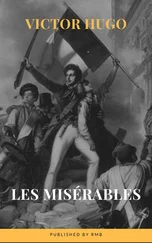Victor Hugo - Les Misérables, v. 5
Здесь есть возможность читать онлайн «Victor Hugo - Les Misérables, v. 5» — ознакомительный отрывок электронной книги совершенно бесплатно, а после прочтения отрывка купить полную версию. В некоторых случаях можно слушать аудио, скачать через торрент в формате fb2 и присутствует краткое содержание. Жанр: literature_19, foreign_antique, foreign_prose, на английском языке. Описание произведения, (предисловие) а так же отзывы посетителей доступны на портале библиотеки ЛибКат.
- Название:Les Misérables, v. 5
- Автор:
- Жанр:
- Год:неизвестен
- ISBN:нет данных
- Рейтинг книги:3 / 5. Голосов: 1
-
Избранное:Добавить в избранное
- Отзывы:
-
Ваша оценка:
- 60
- 1
- 2
- 3
- 4
- 5
Les Misérables, v. 5: краткое содержание, описание и аннотация
Предлагаем к чтению аннотацию, описание, краткое содержание или предисловие (зависит от того, что написал сам автор книги «Les Misérables, v. 5»). Если вы не нашли необходимую информацию о книге — напишите в комментариях, мы постараемся отыскать её.
Les Misérables, v. 5 — читать онлайн ознакомительный отрывок
Ниже представлен текст книги, разбитый по страницам. Система сохранения места последней прочитанной страницы, позволяет с удобством читать онлайн бесплатно книгу «Les Misérables, v. 5», без необходимости каждый раз заново искать на чём Вы остановились. Поставьте закладку, и сможете в любой момент перейти на страницу, на которой закончили чтение.
Интервал:
Закладка:
Cosette dressed herself very rapidly, and combed and dressed her hair, which was very simple at that day, when women did not swell their ringlets and plaits with cushions and pads, and placed no crinoline in their hair. Then she opened the window and looked all around, hoping to discern a little of the street, an angle of the house, or a corner of the pavement, to watch for Marius. But nothing could be seen of the outside: the court-yard was surrounded by rather lofty walls, and was bounded by other gardens. Cosette declared these gardens hideous, and for the first time in her life considered flowers ugly. The paltriest street gutter would have suited her purpose better; and she resolved to look up to heaven, as if she thought that Marius might possibly come thence. Suddenly she burst into tears, not through any fickleness of temperament, but her situation consisted of hopes dashed with despondency. She confusedly felt something horrible; that it was really in the air. She said to herself that she was sure of nothing, that letting herself out of sight was losing herself; and the idea that Marius might return to her from heaven appeared to her no longer charming but lugubrious. Then – for such these clouds are – calmness returned, and hope, and a species of smile, unconscious, but trusting in God.
Everybody was still asleep in the house, and a provincial silence prevailed. No shutter was opened, and the porter's lodge was still closed. Toussaint was not up, and Cosette naturally thought that her father was asleep. She must have suffered greatly, and must still be suffering, for she said to herself that her father had been unkind, but she reckoned on Marius. The eclipse of such a light was decidedly impossible. At moments she heard some distance off a sort of heavy shock, and thought how singular it was that gates were opened and shut at so early an hour; it was the sound of the cannon-balls battering the barricade. There was a martin's nest a few feet below Cosette's window in the old smoke-blackened cornice, and the mouth of the nest projected a little beyond the cornice, so that the interior of this little Paradise could be seen from above. The mother was there expanding her wings like a fan over her brood; the male bird fluttered round, went away, and then returned, bringing in his bill food and kisses. The rising day gilded this happy thing; the great law, increase and multiply, was there smiling and august; and the sweet mystery was unfolded in the glory of the morn. Cosette, with her hair in the sunshine, her soul in flames, enlightened by love within and the dawn without, bent forward as if mechanically, and, almost without daring to confess to herself that she was thinking at the same time of Marius, she began looking at these birds, this family, this male and female, this mother and her little ones, with all the profound agitation which the sight of a nest occasions a virgin.
CHAPTER XI
THE SHOT WHICH DOES NOT MISS AND WHICH KILLS NOBODY
The fire of the assailants continued, and the musketry and grape-shot alternated, though without producing much mischief. The upper part of Corinth alone suffered, and the first-floor and garret windows, pierced by slugs and bullets, gradually lost their shape. The combatants posted there were compelled to withdraw; but, in fact, such are the tactics of an attack on a barricade, – to skirmish for a long time and exhaust the ammunition of the insurgents, if they commit the error of returning the fire. When it is discovered by the slackening of their fire that they have no powder or ball left, the assault is made. Enjolras had not fallen into this trap, and the barricade did not reply. At each platoon fire Gavroche thrust his tongue into his cheek, a sign of supreme disdain.
"That's good," he said; "tear up the linen, for we require lint."
Courfeyrac addressed the grape-shot on its want of effect, and said to the cannon, —
"You are becoming diffuse, my good fellow."
In battle, intrigues take place as at a ball; and it is probable that the silence of the redoubt was beginning to render the assailants anxious, and make them fear lest some unexpected incident had occurred. They felt a need of seeing clearly through this pile of paving-stones, and what was going on behind this impassive wall, which received shots without answering them. The insurgents suddenly perceived a helmet glistening in the sun upon an adjoining roof: a sapper was leaning against a tall chimney-pot and apparently a sentry there. He looked down into the barricade.
"That's a troublesome spy," said Enjolras.
Jean had returned Enjolras his fowling-piece, but still had his own musket. Without saying a word he aimed at the sapper, and a second later the helmet, struck by a bullet, fell noisily into the street. The soldier disappeared with all possible haste. A second watchman took his place, and it was an officer. Jean Valjean, who had reloaded his musket, aimed at the new-comer, and sent the officer's helmet to join the private's. The officer was not obstinate, but withdrew very quickly. This time the hint was understood, and no one again appeared on the roof.
"Why did you not kill the man?" Bossuet asked Jean Valjean, who, however, made no reply.
CHAPTER XII
DISORDER THE PARTISAN OF ORDER
Bossuet muttered in Combeferre's ear, —
"He has not answered my question."
"He is a man who does kind actions with musket-shots," said Combeferre.
Those who have any recollection of this now distant epoch know that the suburban National Guards were valiant against the insurrection, and they were peculiarly brave and obstinate in the days of June, 1832. Any worthy landlord, whose establishment the insurrection injured, became leonine on seeing his dancing-room deserted, and let himself be killed in order to save order represented by the suburban public-house. At this time, which was at once heroic and bourgeois, in the presence of ideas which had their knights, interests had their Paladins, and the prosaic nature of the motive took away none of the bravery of the movement. The decrease of a pile of crowns made bankers sing the Marseillaise, men lyrically shed their blood for the till, and defended with Lacedæmonian enthusiasm the shop, that immense diminutive of the country. Altogether there was a good deal that was very serious in all this; social interests were entering into a contest, while awaiting the day when they would enter a state of equilibrium. Another sign of this time was the anarchy mingled with the governmentalism (a barbarous name of the correct party), and men were for order without discipline. The drums played unexpectedly fancy calls, at the command of some colonel of the National Guard: one captain went under fire through inspiration, while some National Guards fought "for the idea," and on their own account. In critical moments during the riots men followed the advice of their chiefs less than their own instincts, and there were in the army of order real Guerilleros, some of the sword like Fannicot, and others of the pen like Henry Fonfrède. Civilization, unhappily represented at this period more by an aggregation of interests than by a group of principles, was, or believed itself to be, in danger; it uttered the alarm cry, and every man, constituting himself a centre, defended, succored, and protected it in his own way, and the first comer took on himself to save society.
Zeal sometimes went as far as extermination; a platoon of National Guards constituted themselves of their own authority a council of war, and tried and executed in five minutes an insurgent prisoner. It was an improvisation of this nature which killed Jean Prouvaire. It is that ferocious Lynch law with which no party has the right to reproach another, for it is applied by the Republic in America as by monarchy in Europe. This Lynch law was complicated by mistakes. On a day of riot a young poet of the name of Paul Aimé Garnier was pursued on the Place Royale at the bayonet's point, and only escaped by taking shelter under the gateway at No. 6. "There's another of those Saint Simonians," they shouted, and wished to kill him. Now, he had under his arm a volume of the Memoirs of the Duc de Saint Simon; a National Guard read on the back the words "Saint Simon," and shouted, "Death to him!" On June 6, 1832, a company of suburban National Guards, commanded by Captain Fannicot, to whom we have already referred, decimated the Rue de la Chanvrerie for his own good pleasure, and on his own authority. This fact, singular though it is, was proved by the judicial report drawn up in consequence of the insurrection of 1832. Captain Fannicot, an impatient and bold bourgeois, a species of condottiere of order, and a fanatical and insubmissive governmentalist, could not resist the attraction of firing prematurely, and taking the barricade all by himself, that is to say, with his company. Exasperated at the successive apparition of the red flag and the old coat, which he took for the black flag, he loudly blamed the generals and commanders of corps, who were holding councils, as they did not think the decisive moment for assault had arrived, but were "letting the insurrection stew in its own gravy," according to a celebrated expression of one of them. As for him, he thought the barricade ripe, and as everything that is ripe is bound to fall, he made the attempt.
Читать дальшеИнтервал:
Закладка:
Похожие книги на «Les Misérables, v. 5»
Представляем Вашему вниманию похожие книги на «Les Misérables, v. 5» списком для выбора. Мы отобрали схожую по названию и смыслу литературу в надежде предоставить читателям больше вариантов отыскать новые, интересные, ещё непрочитанные произведения.
Обсуждение, отзывы о книге «Les Misérables, v. 5» и просто собственные мнения читателей. Оставьте ваши комментарии, напишите, что Вы думаете о произведении, его смысле или главных героях. Укажите что конкретно понравилось, а что нет, и почему Вы так считаете.












